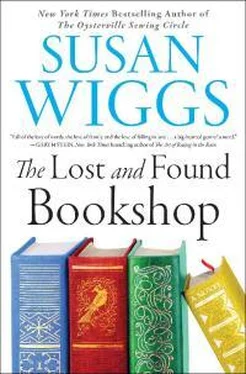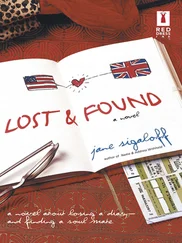“Sure,” he said, clipping the tape measure onto his tool belt. “Let’s go.”
As they passed through her apartment, she wondered what he saw when he looked around. It still felt more like her mom’s place than hers, although she’d done some tidying up and rearranging in the living room and tiny galley kitchen. The one area she hadn’t tackled was behind the closet door in the bedroom. The thought of culling through her mother’s clothes and shoes and personal items made her immeasurably sad. Sometimes she was tempted to simply hire a service to scoop everything up and carry it away. But then she feared she might miss something she didn’t know she needed—a special memento or something that might spark a comforting memory for her or her grandfather.
In the back office, Tess set her box on the big library table, then used her phone to scan a code on the box. “Provenance tracking has gone high-tech,” she said.
Natalie felt a flutter of excitement. If the object was worthy of high-tech tracking, that probably meant the vase was something special.
Tess opened the box and took out the vase, which had been carefully packed in layers of bubble wrap. Setting it on the table, she asked, “What do you see when you look at this?”
Grandy put on his glasses. “I’ve seen such things for sale in a hundred shops in Chinatown. It’s quite pretty, isn’t it? Were you able to trace this one?”
“It cleaned up so well,” Natalie said. The figures were pearlescent, delicately formed and surrounded by swirling embellishments. The colors were intense and layered, with a depth that made the details stand out as if three-dimensional. She cringed, remembering how she’d nearly dropped the thing because of a spider.
“It’s not from Chinatown,” Tess said. “Any other guesses?”
“It’s from the Qianlong period in the Qing dynasty,” said Peach.
Natalie threw him a sharp look. He never failed to surprise her with the things he said, seeming to pull them out of his back pocket like a handy tool. “Tess, is that right?”
Her friend nodded.
“How would you even know that?” Natalie asked. “How would anyone know that?”
He grinned. “I read books and I know stuff.”
“But— Never mind, smart aleck,” she said. “You’re just showing off.”
He hooked his thumb into his jeans pocket and nodded toward the vase. “I took a picture of the porcelain mark on the bottom and looked it up. It’s a Qianlong mark.”
“Not bad,” said Tess. Her gaze lingered on him for a moment with a gleam of admiration. “So the factors we consider are the market for a certain piece, its condition, and its provenance. And of course, its rarity. This one—super rare. The market for Asian ceramic antiquities is always vibrant. A piece with that mark is very hot right now.”
“I wouldn’t even know to look for a mark,” Natalie admitted.
“A similar piece sold at auction in Paris for more than nineteen million dollars.”
Peach gave a low whistle that expressed everything Natalie felt.
“Oh, come on. No. ” She caught her breath. “Wow. Seriously?”
Tess nodded. “Antiquities can be serious business. This vase is in perfect condition—no cracks or chips, and it’s well fired. That’s the good news.”
“Meaning there’s bad news?” asked Natalie, her heart sinking.
“There’s . . . other news,” Tess said. “The value of a piece is affected by its provenance. If it’s stolen or a forgery or otherwise compromised, its value will reflect that.” She handed a document to Natalie. “I made you a printout of my research, and you can read it, but your eyes will probably glaze over.”
“Can you sum it up for us?” asked Natalie. “Was it stolen?”
“Not quite. It belonged to the Tang family—a prosperous merchant clan affiliated with a guild in Hankou, which is called Wuhan City these days. The eldest son, Wen Tang, was born in Shanghai in the 1800s, and he was one of a handful of young boys sent to study in America. The vase and other treasures were sent with him as gifts. He was hugely successful in business, and when it was time to return to China, he elected to stay. To do that, he had to bribe immigration agents.”
“So how did the vase end up in our building?” Natalie asked.
“Some of the immigration agents blackmailed the guy and took nearly everything from him. He managed to hide a few of his belongings away, and this is one of them. He died of bubonic plague before he could retrieve it.”
“The plague? In San Francisco?”
“There was an outbreak in Chinatown in 1900,” Grandy said. “Charlie’s grandmother was taken by it, and he says this is why his father grew up to be a physician.”
“Wen Tang’s sons survived and started a finance and investment company. They’re founding members of the Chinese American Heritage Society. It’s a nonprofit, housed in an amazing Beaux-Arts building over in the Tenderloin District. It’s kind of a big deal.”
“So what I hear you saying is that it’s possible to track down the rightful owners of the vase.”
“With pretty high confidence, yeah,” said Tess.
“Did you follow that?” Natalie asked her grandfather.
“It belongs to the Tang family, is that correct?” he asked. “In that case, we’ll need to contact them.”
“The decision is yours, Grandy.” She looked at Tess, who nodded. Her phone vibrated with an incoming text, but she ignored it.
“It’s hard to anticipate how these things go,” Tess explained. “You could make a claim of possession. With a piece of this value—”
Grandy held up a hand, palm out. “I wouldn’t feel right keeping it, particularly since it belonged to an immigrant from China. We can only imagine the struggles of people emigrating to America in that period. The racism was objectively vicious. It would be wrong to claim something that was brought here at such a high human cost.” He paused, eyeing the beautiful piece. “We should contact the Tang family and see what happens next,” he concluded.
Natalie felt a surge of pride in her grandfather. Despite his confusion and moments of dementia, he was still the man she had always known. He possessed a shining humanity that demanded fairness and decency. Even though the found objects had taken up residence in his building for more than a hundred years, he never once considered them his.
Peach patted Grandy on the shoulder. “It’s really cool of you to try finding the owners.”
Watching him with her grandfather, Natalie got a warm feeling inside. A forbidden feeling. One she made herself shut down through force of will.
“I won’t forget that you are the person who found the vase,” Grandy said. “Without you, none of this would have come about.”
“You led me right to it, Andrew. Anyway,” Peach said with a nod at Tess, “I need to wrap it up early today. Plans tonight. It was great meeting you. Good luck with everything.”
When he was gone, Tess picked up a file folder and fanned it at Natalie. “Down, girl.”
Natalie flushed. “Knock it off.”
“I don’t blame you. He’s hot in that ponytail-pirate, I-can-fix-anything kind of way.”
“But not in that I-have-a-wife-and-a-kid kind of way.”
“Oh, I didn’t realize. I guess it’s the old adage,” Tess whispered. “The good ones are all taken. Judging by the way you looked at him, I’m guessing he’s a good one.”
“I’m not looking at him in any way,” Natalie protested. “Or, if I am, it’s just that there’s more to him than meets the eye. He’s read every book, and he’s like a walking encyclopedia.”
Tess shrugged. “Ah, well. On to the next big adventure.”
“Yeah, about that.” Natalie hesitated, then showed her friend the text message from Trevor that had come in during their meeting.
Читать дальше












